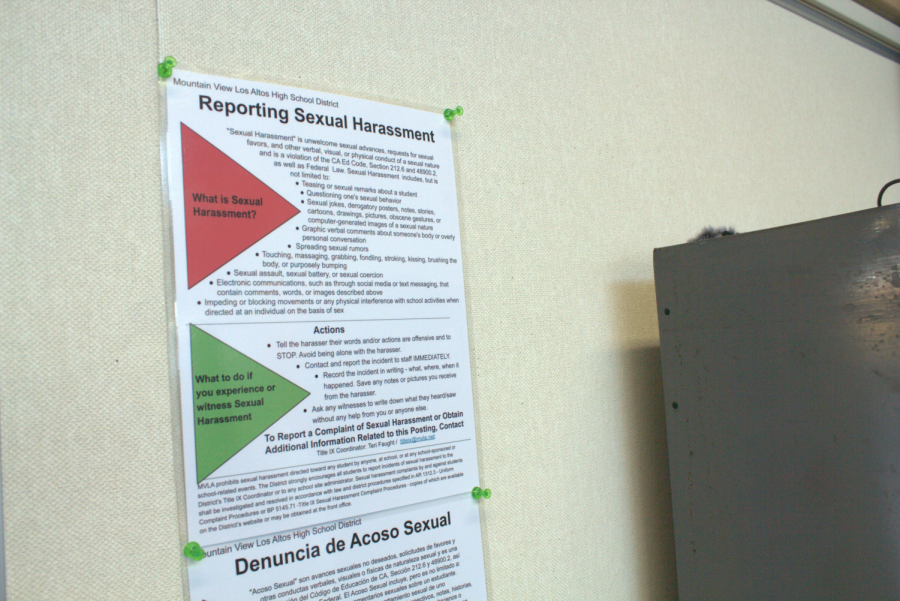School District updates Title IX sexual harassment policies
A photo of the sexual harassment posters distributed to teachers this year. The District updated its Title IX sexual harassment policy this year, including creating a team specifically dedicated to handling Title IX harassment cases.
Over the summer, the Mountain View–Los Altos (MVLA) District updated its Title IX sexual harassment policies, including creating a dedicated Title IX team to handle issues such as sexual harassment cases.
“There’s nothing more that any of us at the District want than for all students to feel safe and to have the complete potential to focus on their right to an education,” Title IX Coordinator Teri Faught said.
Title IX of the Education Amendments of 1972 is a national law that prevents government-funded schools from discriminating against students or employees by sex, including providing protection from sexual harassment and assault.
This summer, the District put together a dedicated Title IX team that will oversee all complaints under the jurisdiction of Title IX. This team includes a coordinator, various investigators and decision-makers. Sexual harassment cases that don’t fall under Title IX will continue to be directed to the Assistant Principals.
This June, the Biden administration released proposed changes to Title IX, which would expand the definitions of sex-based harassment and discrimination to include sexual orientation and gender identity. In addition, many of these proposed changes were written to reverse changes by the previous Trump administration, which significantly increased the burden of proof for harassment and discrimination. Under the Trump administration, if a complaint progressed to the investigation stage, the regulations required the complainant to be cross-examined in a room with the perpetrator.
“It was like a trial,” Director of Student Services and Equity Perla Pasallo said in regards to the previous sexual harassment policy. “The revisions offer much more protection in a quicker time with less bulk.”
Although these proposals have not been put in place yet, the District has already modified the school’s sexual harassment policies, making the complaint process more accessible.
As part of the push to streamline and improve the school’s sexual harassment policy, all teachers were given laminated posters in Spanish and English to put up in their classrooms with details about what sexual harassment is and how to respond to it. The poster lists situations considered sexual harassment and provides a few next steps for reporting the incident, including recording the harassment in writing and contacting a teacher or administrator immediately.
“You have the right not to be harassed, you have the right not to be assaulted, you have the right to be safe on campus,” District Wellness Coordinator William Blair said. “If anyone is violating that right, let the administration know.”
Even if a sexual harassment complaint doesn’t fall under Title IX, the school still has a range of support measures it can take to protect the complainant, which can include disciplinary actions or other supportive measures to keep involved parties separate on campus.
“What’s going on isn’t always pervasive and severe, but it’s annoying and students want it to stop,” Blair said. “It doesn’t have to break the law for students to come to us for help.”
School policies are constantly undergoing revision as a result of state or federal changes, but policy revisions also consider student feedback. Last April, the school hosted an online webinar during Academic Collaboration Time about sexual harassment and safe relationships, with the opportunity to submit feedback at the end. The District hopes that with updated policies and increased awareness, school can be a safer and more inclusive space for all students.
Students looking to submit a sexual harassment complaint for themselves or someone else should email Faught at [email protected], who coordinates investigation and communication with students and families in the case of a Title IX complaint.
“If you come and report an event, you will be listened to and heard,” Faught said. “We will take it seriously, we will work with you, we will listen to you, and we will do our due diligence of following through.”





